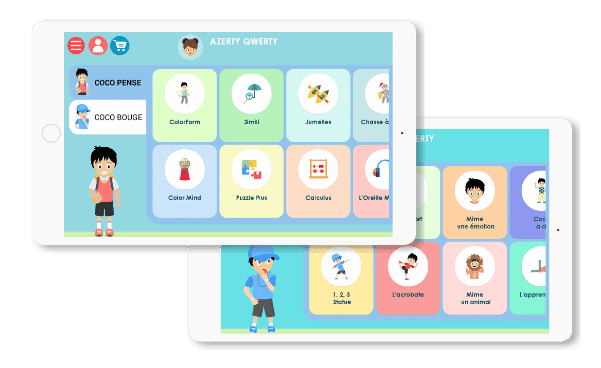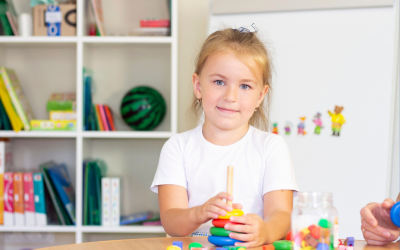Nowadays, screens are omnipresent in our daily lives, whether for work, leisure or communication. However, a growing body of research shows that screen time can have effects on the social development of individuals, especially children and adolescents.
Social development refers to how we interact with others, how we perceive and understand the emotions and behaviors of others, and our ability to make friends, collaborate, and resolve conflicts.
How can screen time affect children’s social development?
Screen time can negatively affect children’s social development in a number of ways. First, spending a lot of time in front of a screen can reduce the amount of time spent in face-to-face social activities with other children and adults. Children who spend a lot of time in front of screens may have fewer opportunities to play with friends, interact with family and participate in community activities. This can affect their ability to understand the emotions and behaviors of others, as well as their ability to communicate effectively with others.
In addition, screen content can also have a negative impact on children’s social development. Children who watch television programs or YouTube videos that are not age-appropriate may be exposed to inappropriate situations, behaviors or attitudes, such as violence, foul language, discrimination and early sexuality. This can affect their perception of what is and is not acceptable and can also affect their ability to interact with others appropriately.
Finally, screen time can also affect the quality of children’s sleep, which can have an impact on their social development. Children who spend a lot of time in front of screens may have difficulty falling and staying asleep, which can make them tired, irritable and less able to manage their emotions and communicate effectively with others.
For example, a child who spends a lot of time playing violent video games may become more aggressive toward peers or have difficulty understanding how to resolve conflicts peacefully. Similarly, a child who watches age-inappropriate YouTube videos may learn inappropriate behaviors and attitudes that can affect his or her ability to interact with others in a healthy and respectful manner. On the other hand, a child who plays educational games with peers or watches age-appropriate television programs can learn important social skills such as cooperation, communication and problem solving.
What advice do parents have on how to foster their children’s social development away from screens?
It is important for parents to balance the time their children spend in front of screens with the time they spend interacting with others face-to-face. Here are some practical tips for fostering their children’s social development away from screens:
-
Encourage group activities
Group activities can help build children’s social skills, such as communication, collaboration, empathy and problem solving. This can be especially beneficial for children who have difficulty forming social relationships or who are shy.
Group activities can promote diversity and inclusion by providing opportunities for children to meet people from different backgrounds and walks of life. This can help children develop an open mind and learn to respect the differences of others.
-
Play with your children
Playing with your children is a way to strengthen family bonds by creating positive memories and developing a trusting relationship with your children. This can help children feel loved and valued, which can contribute to their self-esteem.
Play is an important way for children to develop their cognition, creativity and problem-solving skills. Group games can also help children learn to collaborate, share and communicate effectively with others.
Group activities can help children develop decision-making skills by providing opportunities to discuss, negotiate and vote on important choices. This can be beneficial for children who tend to be indecisive or have difficulty expressing their opinions.
-
Encourage interaction with peers
Interactions with peers help children develop important social and emotional skills such as communication, collaboration, problem solving and empathy. These skills are essential for building healthy relationships with others throughout life.
Working with peers can encourage collaborative learning, which is a process where students work together to solve problems, share ideas, and build knowledge together. This method promotes a better understanding of concepts and can help build confidence.
-
Encourage physical activity
Regular physical activity can help strengthen muscles, bones and joints, as well as improve physical fitness and cardiovascular health. They can also help reduce the risk of chronic diseases such as diabetes, obesity and heart disease.
Physical activity can also have mental health benefits. They can help reduce stress, anxiety and depression, while improving sleep quality and confidence.
-
Practice empathy
It helps us to better understand and communicate with others. Empathy allows us to put ourselves in someone else’s shoes and understand their feelings and emotions. This can help strengthen interpersonal relationships, resolve conflicts constructively and encourage cooperation.
In addition, empathy is beneficial to our own well-being. By better understanding others, we are better able to manage our own emotions and show compassion to ourselves. By cultivating empathy, we become more aware of our surroundings and the people around us, which can help us feel more connected and engaged in our relationships.
At what age should we talk to our children about screen time?
It is important to start educating children about the impact of screen time at a young age. Even young children can be exposed to screens, whether it’s watching TV, playing video games or using tablets or smartphones. Studies have shown that exposure to screens can affect the brain development of children under the age of two, which can have long-term consequences on their ability to concentrate and learn.
It is therefore recommended to limit the exposure of children under two years of age to screens, avoiding the use of screens for children under 18 months completely and limiting the exposure of children between 18 and 24 months to high quality and interactive content, watching it with them and promoting physical and social play activities.
For older children, it is important to continue to monitor their screen time and teach them to use screens responsibly and healthily. Parents can discuss with their children the importance of limiting their screen time, making wise content choices and taking regular breaks to rest their eyes and do alternative activities.
It is also important to understand that technological tools are not our enemy. Despite all that we hear around us, some educational platforms allow children to learn proper use of screens, and even serve as accountability tools for children.
This is the case with the COCO THINKS and COCO MOVES © applications, which include a sports break after 15 minutes of play.
This break allows the child to realize how much time is spent on the tablet or smartphone, and introduces good reflexes regarding their use.
Discover the application COCO THINKS and COCO MOVES ©.
The COCO THINKS and COCO MOVES application contains more than 30 educational games to work on French, math, logic, memory, or attention.
In addition, the application imposes a sports break every 15 minutes of screen time to teach measured screen use.
Much smarter than a parental control!

It is also important to educate children about the risks associated with excessive screen use, such as addiction, obesity, sleep disorders and mental health issues. By helping them understand the negative consequences of excessive screen use, we can encourage them to make informed decisions and adopt healthy, balanced lifestyle habits.
In sum, it is important to start educating children about the impact of screen time at a young age, teaching them to use screens responsibly and helping them develop healthy, balanced habits.
In conclusion, it is crucial to consider the impact of screen time on the health and well-being of children. Excessive exposure to screens can affect their cognitive development, physical and mental health, and their ability to interact with others. It is therefore important to educate children about the risks associated with excessive screen use, to limit their screen time and to offer them healthy and stimulating alternatives. By encouraging children to be active, to interact with their peers, to play and to explore the world around them, we can help them develop healthy, balanced habits that will allow them to thrive and grow harmoniously.
Other articles that might interest you:
Supporting children with autism
Dynseo proposesSUPPORTING CHILDREN WITH AUTISM with COCO THINKS AND COCO MOVESDynseo and its team are very much...
Supporting DYS children with COCO THINKS and COCO MOVES
Dynseo proposesDYS disorders with COCO THINKS and COCO MOVESOur educational and pedagogical games program COCO THINKS...
Language development
Children communicate from birth with movements, crying, looking at each other or with smiles. After only a few months,...
Supporting children with Down Syndrome with Coco
Dynseo proposesDOWN SYNDROME with COCODown syndrome is a non-hereditary chromosomal abnormality that leads to the...
Supporting people after a stroke
Dynseo proposesStroke with CLINT, your brain training coachThe Dynseo team is very involved in helping people who have...
Supporting someone with Alzheimer’s
In this guide, we will detail how SCARLETT can be used for supporting someone with Alzheimer's. SCARLETT is a...
10 myths about the human brain you didn’t know
The brain is an incredible muscle, however there are many things we do not know, and what we do know is not always...
Using Digital Tools to Support Students with Special Educational Needs
Special Educational Needs (SEN) encompass a wide range of learning difficulties and disabilities that can hinder a...
Down Syndrome and Communication: Facilitating Interaction with Visual and Interactive Supports
When we think about Down syndrome, we often recognize it as a genetic condition that affects physical and cognitive...
How to Track Progress in People with Down Syndrome Using Digital Tools
Down syndrome, a genetic condition caused by the presence of an extra chromosome 21, affects approximately 1 in every...













